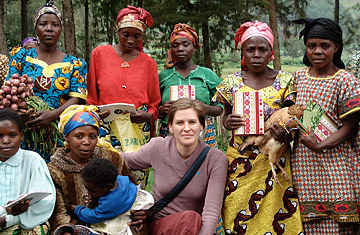
Lisa Shannon and her sponsored sisters.
Lisa Shannon could not sit still after watching an episode of The Oprah Winfrey Show that revealed the story of the world's deadliest conflict — a Congolese war in which scores of women are raped, and hundreds of men, women, and children are killed on a daily basis. Shannon sacrificed a comfortable job, left her fiancé and raised $50,000 to sponsor women in Congo. Once there, she documented a seemingly forgotten war and continues her work in the country. She tells the story in her new book A Thousand Sisters. She talked to TIME about the international community's shocking silence, how Congo copes and why you don't need to go to there to help out.
Many people saw the same Oprah episode you did, yet weren't willing to change everything. What motivated you to dedicate your life to the cause of Congolese women?
With the initial Oprah episode, I was obviously really stirred and immediately signed up to sponsor two women. But it stayed on my mind. I read stories of women being told they weren't human and wouldn't be missed if they were killed. Essentially the world has agreed with that. That if these 5.5 million people die they're not really missed.
You write about many horrifying stories. Is there one that sticks with you?
Generose. The FDLR (a Rwandan Hutu militia linked to the 1994 genocide) showed up at Generose's home and demanded money. She gave them everything she had — $120 — but they wanted more. They started beating her husband and Generose cried out to alert her neighbors. As punishment they killed her husband and then cut off Generose's leg, cooked it over the fire, and told the children to eat the leg. Her nine-year old son refused so they killed him. The other children did as they were told. [The militia members] tried to burn them alive, but her children managed to drag her out of the house and save her. Next door, they killed an entire wedding party. That kind of attack, where 30 or 50 people are killed at one time, was standard in the village of Kaniola.
And this violence is still happening?
Absolutely. There have been many times I've heard people frame Congo like it's post-conflict. Congolese people find that idea really offensive. I've talked to a number of women who have been raped by the Congolese army. Security is all relative and things may shift in terms of what militia is doing what at any given moment.
Why is the international community unaware?
The U.S. government isn't doing more because they aren't hearing from Americans. We need to ask questions about the way we relate to Africa and what we consider baseline violence. People tend to hear about situations like Congo and say things like "it's tribal, rape is cultural in Africa." That I find fundamentally offensive and categorically inaccurate. If you talk to any Congolese person they would say that before 1996, these were not issues.
The comment that rape is cultural was mentioned in your book. Why do some people consider it that way?
It's a place that we tend to go when people hear about situations like that. A critical piece of the story is left out. I heard stories about a militia holding a gun to a man's head and telling him to rape his own child or sister. And he chose to be killed instead. When you start talking about rape in Congo being "cultural," there's no way a culture that celebrates rape could produce men like that. Here are people living through the worst violence the world has seen since World War II, and not only do we ignore it but then we hurl on top of it this assertion that "it's just who you people are."
Were there any points while you were there where you wanted to quit?
It's not my job to measure the results. It's my job, as it is anyone's job, to show up. Last month we held a Run for Congo Women event in Congo for the first time. There was something so powerful that after everything, no militia could steal their compassion or power. With these stories, you have moments where you question humanity. The run was a clear answer to that: even in the face of the worst violence, it can't take away these women's spirits.
How do you want people to respond?
They can sponsor a Congolese woman. It will instantly be a lifeline for her. You're very likely saving a child's life when you do it. I also would recommend joining the Raise Hope for Congo campaign, which works on policy work to end the violence for good. We're really looking at one of the first periods in human history where movements are developing to prevent and end mass atrocities while they're happening, instead of [just] expressions of regret later on.
